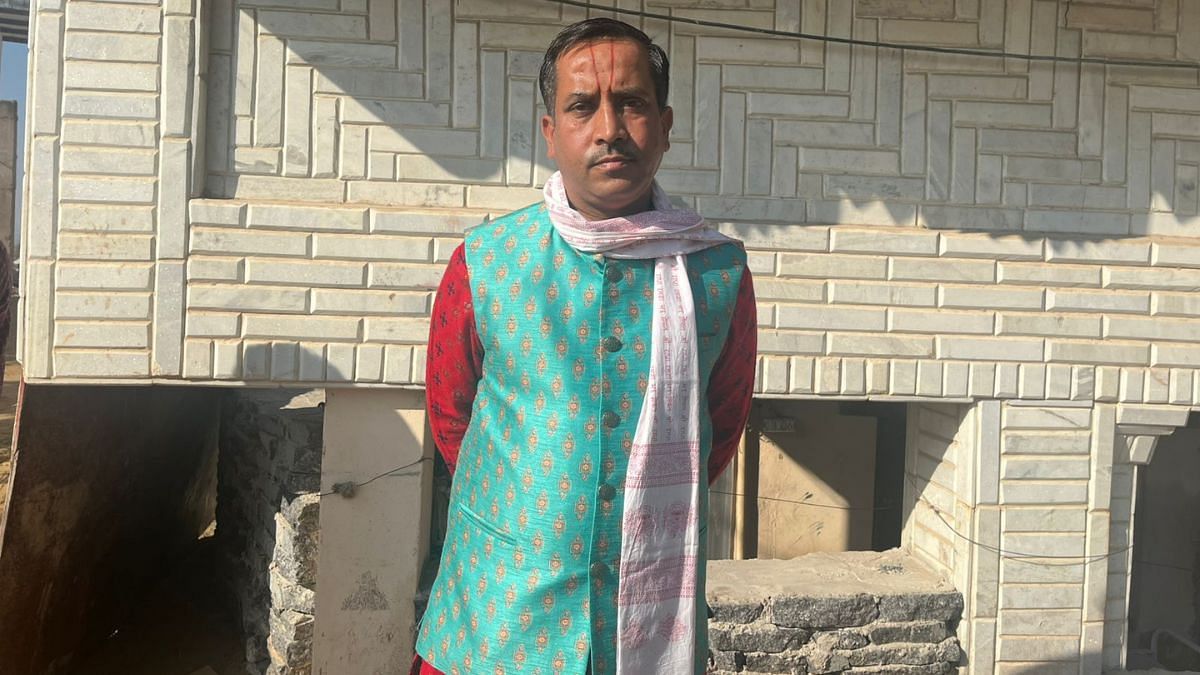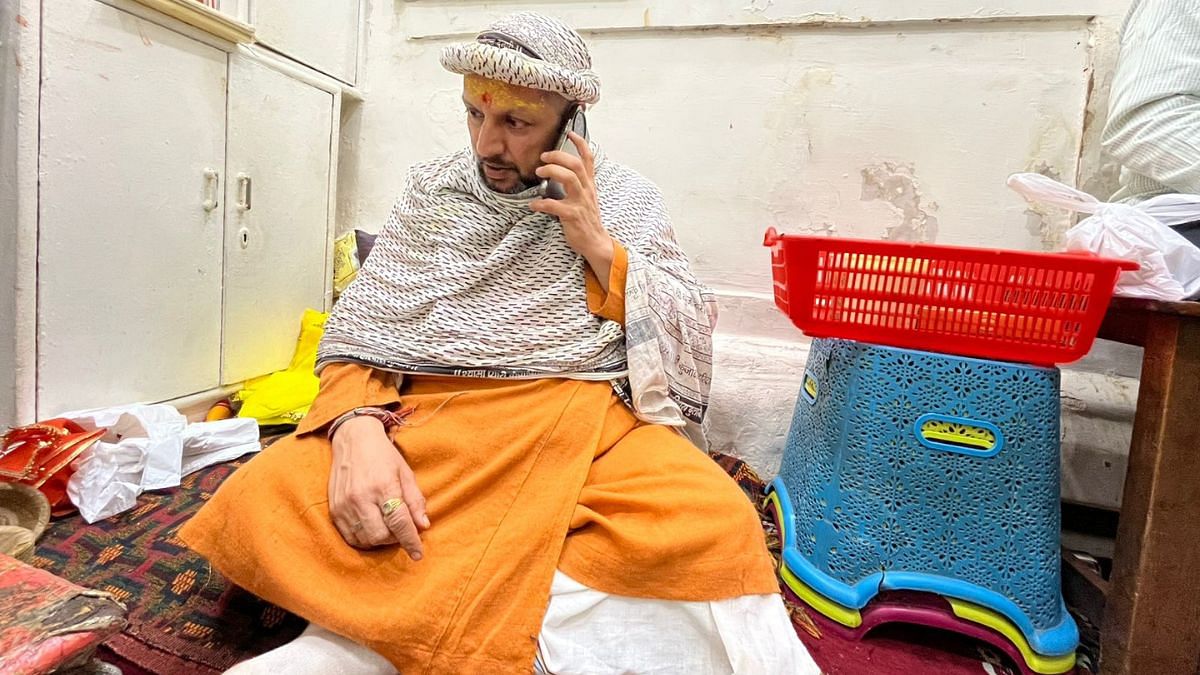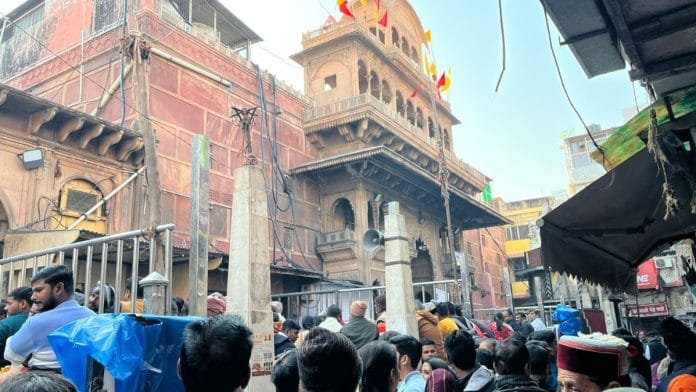Barsana/Mathura: R.K. Pandey is a teacher by profession, but for the past 10 years he has been better known as a ‘receiver’ of Mathura’s ancient Dauji temple.
“The Dauji temple in Mathura is the only temple where receivers are appointed without any dispute. In 1925, the court decided that the temple will run through receivership,” said Pandey.
A few months ago, however, Pandey resigned from the temple receiver’s post following a corruption complaint, handing over the responsibilities to his manager. The police probe found the complaint to be fake, and Pandey is now waiting for the court to decide on his receivership.
“This has been going on for decades. I did not take this post on my own; the judge appointed me,” Pandey said.
For years, many temples in Mathura have been operating under a receivership system in which courts appoint people as receivers to maintain operational continuity and ensure temple activities like daily rituals and festivals proceed without disruption when disputes arise.
“A receiver manages the finances, oversees maintenance, and ensures that devotees have a seamless experience,” Pandey explained.
Now, the Supreme Court has raised concerns about this system due to numerous temple-related litigation cases pending in courts, and directed the Mathura district judge to submit a report on temples following a receivership model on 19 December.
Under the receivership system, lawyers, teachers and journalists step in as receivers to run temples in Mathura and the court appoints a receiver committee to manage a temple’s administration until the case is resolved.
With many advocates sitting in the receiver’s chair and cases dragging on for years, the court said these people often prolong the case for their personal benefit and the suit never ends. It also said temples should be managed by people with temple management expertise.
“Time has come when all these temples should be freed from the clutches of practicing advocates of Mathura Court, and the courts should make every effort to appoint, if necessary, a receiver who is connected with the management of the temple and has some religious leaning towards the deity,” the Supreme Court said.
“He should also be well-versed with the Vedas and shastras. Advocates and people from the district administration should be kept away from the management and control of these ancient temples,” the court added. “Efforts should be made to dispose of the suits involving temple disputes at the earliest, and the matter should not linger for decades.”
The court order came in response to a petition against an Allahabad High Court decision that advocates and people from the district administration should be kept away from the management and control of temples.
Sanjay Goswami, a 52-year-old lawyer who was the receiver of Shri Radha Rani Temple in Barsana for nine months, reiterated that cases often get delayed because the receiver is an advocate.

“People who fight for the post of pujari belong to the same family; it is very much like a property dispute. The sewa is a kind of ancestral property, and when the parties can’t make a decision among themselves, they go to court. Since the court can’t announce the decision quickly, it appoints a receivership committee,” Sanjay Goswami told ThePrint.
“In most cases, the receiver is an advocate. This shouldn’t happen. They won’t let the case end as they want to become the receiver, to their own benefit.”
Goswami, who says he resigned from his post because of internal politics, believes the receivership system should be scrapped.
“I gave up my post last February. I was the receiver, and there were two other people with me. In my opinion, this receivership should end as there is a lot of corruption and the receiver can’t make any big decisions because the real culprits belong to the same community,” said Goswami, who works as a lawyer in Chhata Court and lives in Barsana.
Origins of the receivership system
The receivership system in Mathura originated from the need to manage temple disputes, often stemming from claims of ancestral ownership.
For decades, these disputes have created divisions among priests and local communities. Temples, considered the spiritual and economic backbone of Mathura, became battlegrounds for conflicting interests.
When disputes arise, courts appoint receivers to maintain operational continuity at temples.
Generally, a receiver collects all the money from donation boxes except those in front of the temple idol. Apart from that, the receiver also handles the temple’s money and bank account.
At the Shri Radha Rani Temple in Barsana, for instance, a five-member committee runs the temple. It is responsible for managing the offerings collected in boxes outside the temple and handling the bank accounts.
That money is used to complete various temple projects such as infrastructure development.
“We manage the facilities at the temple and ensure that devotees have the best experience without facing any problems,” said Sushil Goswami, one of the members of the five-member committee. Of the five, one is an advocate, three are pujaris and Sushil is a journalist.

“The court chooses the person who knows about the temples, belongs to the community, and has some reputation in society. I had all those qualities, which is why the court chose me. There are such committees where lawyers are receivers. But in our temple, it’s not like that anymore. The lawyer we had in our committee handles the accounts. He is also a chartered accountant,” said Sushil Goswami.
Lawyers, teachers and many more
The role of a receiver might sound straightforward, but the receivership system often exacerbates problems rather than solving them.
Critics say it delays dispute resolution, fosters corruption, and diverts resources meant for religious purposes.
Today, a total of 197 temples are under litigation. And over eight are under the administration of receivers, including Radha Vallabh Mandir and Anant Shri Bhibhushit in Vrindavan, Dauji Maharaj Mandir in Baldeo, Nandkila Nand Bhawan Mandir in Gokul; Mukharvind and Danghati temples in Govardhan, and Mandir Shree Ladli Ji Maharaj in Barsana.
Most of these temples are managed by practicing advocates from Mathura.
The Supreme Court said that a practicing lawyer cannot dedicate enough time to the administration and management of a temple, especially in Vrindavan and Govardhan, which require temple management expertise along with full devotion and dedication.
“The court observed that the time has come to free these temples from the control of practicing advocates,” said Sanjay Goswami.
Madhu Tyagi, a sociology professor at Babu Shivnath Agrawal University in Mathura, said disputes are inevitable when multiple parties claim rights over a single entity.
She argued that while receivership is essential for temple management, the risk of corruption due to the involvement of money underscores the importance of appointing individuals with integrity to ensure the sanctity of these roles.
“If multiple people claim rights over a single entity, disputes are bound to arise. The concept of receivership itself is not flawed, as temples require a structured system to function efficiently,” Tyagi told ThePrint.
“However, money often leads to corruption, and the courts must ensure that appointments to such positions are given to individuals with strong reputations and integrity. Professionals like lawyers, journalists and teachers may not be the ideal candidates for these roles. Instead, the courts should explore alternative options for appointing individuals better suited to uphold the sanctity and responsibilities of these positions,” she said.
Criticism of the receivership system
Receivership has become a status symbol in the city of Mathura. Many receivers have put stickers on their cars so they can gain benefits from the management such as parking.
Critics say receiverships are more like salaried jobs rather than voluntary roles. In the Barsana temple, for instance, five committee members get paid Rs 15,000 each every month from the temple fund.
“If they have such devotion and feel social responsibility, they should do it for free. Why do they take a salary? There have been many cases in the past when people took temple money home,” said Sanjay Goswami.
Many Barsana residents echo the same view.
“Receivers take money from the temple. They think of themselves as some sort of leader. Everyone respects them for their post as they can help with fast darshan and many other works with the temple. But everyone knows it is just business,” said a resident of Barsana on condition of anonymity.
Another bone of contention is the role of receivers in managing large sums of money generated through donations. For instance, temples like Barsana’s Shri Radha Rani Mandir attract thousands of devotees daily, resulting in significant monetary inflows.
“When I got to know that my fellow pujari did some hera pheri (foul play) with money, I resigned as I couldn’t do anything against him because we are from the same community. In my opinion, the receiver committee should have someone from outside the village so that person can call out others’ mistakes,” Sanjay Goswami added.
Receivers, however, say financial operations at temples are completely transparent.
“We collect money from donation boxes, deposit it into temple accounts, and use it for staff salaries, maintenance and infrastructural development,” said Sushil Goswami, a committee member at the Barsana temple.
“If there is any infrastructural issue, we deal with it. There is a proper entry for every fund. We count the money under CCTV cameras, and a big camera is appointed when we open the donation box,” he added.
Receivers also play an important role in organising cultural events at temples.
“I took the role of receiver in March, and we have organised two big events since then. Everything went smoothly. No devotee faced any trouble, and we took care of the traffic as well because we planned everything. Also, we installed big gates worth Rs 10 lakh in the temple,” said Sushil Goswami.
Divided opinion
Former receivers and priests are divided on the receivership system.
Some welcomed the Supreme Court’s recommendation to appoint receivers with expertise in temple management and religious scriptures to ensure the temple administration remains faithful to its spiritual purpose.
“Everyone has to follow what the Supreme Court says. This practice has been going on for decades. There should be a system to deal with such fights. If a committee is needed, it should consist of people who are really devotees and have some knowledge. Not Robin Hoods who want to use the temple and power,” said Manoj Varshney, a resident of Barsana.
But many priests defended the system, saying not all receiverships operate questionably. To them, the defining factor is devotion.
“It doesn’t matter if the person is a lawyer, a teacher, or a journalist. He should be a true devotee of Lord Krishna. That’s what matters the most. If the Supreme Court has said something, that should be followed, but the top priority is that the person should be a great devotee,” said Gyandendra, also known as Chhotu Goswami, at Banke Bihari Temple in Vrindavan.

The Banke Bihari Mandir in Vrindavan is also under receivership, but that is under a judge, who appointed a manager as a receiver.
Not all temples in Mathura are administered by receivers. Many temples are not involved in any dispute and are managed by temple trusts and committees.
“Temples that don’t face any dispute are being run by the trust and temple committee as there is no fight. For example, the Nand Baba temple in Nandgaon is being run by the temple committee; there is no receiver because there is no fight,” said Sushil Goswami.
But with many receivers and temple managements slugging it out in court, some devotees have expressed concerns about the system.
Ragini Bisht, a 29-year-old visiting Mathura’s temples with her husband, slammed lawyers and teachers in the post of receivers after reading the Supreme Court’s comments.
“We come here with pure hearts and devotion, and such news makes me feel disgusted,” said Bisht. “I don’t think people who come here know about the greed and corruption behind this sainthood.”
(Edited by Sugita Katyal)
Also Read: Jagannath temple Ratna Bhandar a monument to the legacy of those conquered throughout history






